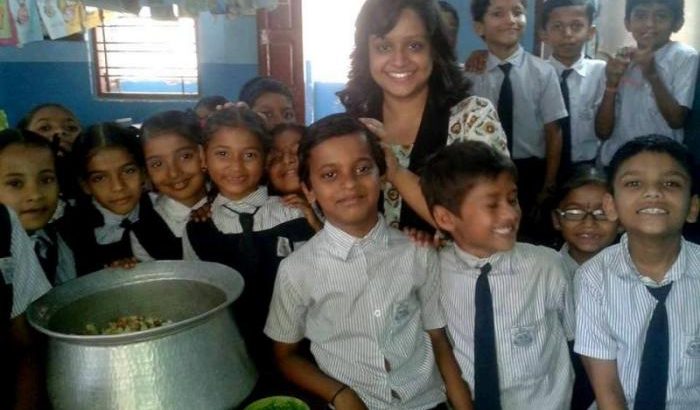India: These Three Young Women Are on a Mission to Send Slum Kids Back to School
India / mayo de 2016/ The Better India
RESUMEN: Muchos niños que viven en los barrios pobres de Mumbai tienen que abandonar la escuela porque sus padres no pueden pagar sus cuotas y en su lugar tienen que trabajar. Tres Fellows Gandhi entiende la gravedad de esta situación y decidió hacer algo al respecto. Neha es una niña de 11 años de edad que vive en los suburbios de Damu Nagar Kandivali. Ella ha perdido a sus padres. Su abuela es la única fuente de ingresos y hace sólo Rs. 2.000 por mes. Con este ingreso, ella no puede comprar los Rs. 160 de pase de autobús mensual para ir a la escuela. Así Neha, que le gusta ir a la escuela y jugar con sus amigos, tiene que quedarse ahora en casa. Un recaudador de fondos en línea con éxito en Milaap ayudó a reunir fondos suficientes para hacerse cargo de los gastos de educación durante todo el año para estos diez niños. El siguiente reto era hacer un seguimiento de su rendimiento y asegurarse de que no faltan a la escuela.
Many kids living in Mumbai’s slums have to drop out of school because their parents cannot afford their fees or want them to work instead. Three Gandhi Fellows understood the gravity of this situation and decided to do something about it.
Neha is an 11-year-old girl who lives in the Damu Nagar slums of Kandivali. She has lost both her parents. Her grandmother is the sole earner and makes only Rs. 2,000 per month. With this income, she cannot buy the Rs. 160 monthly bus pass that Neha needs to go to school. So Neha, who loves to go to school and play with her friends, has to now sit at home instead.
Suhasini Mhaske’s case is no different. Her father drinks heavily and squanders money on alcohol. Her mother used to work but often had to skip meals just to provide her daughter with the bus pass. But now that she is unwell and cannot work, Suhasini too is unable to go to school.
Three Gandhi Fellows, Harsha Ramchandani, Aditi Chatterjee, and Shrestha Ganguly realised this was the case for many students living in the slums. There were many such kids who were missing out on education because their parents could not pay for their education.
They identified eight such kids in the Kandivali slums and a couple of kids in Versova. The effort to take care of round-the-year education of these kids gave rise to Urjayati.
‘Urjayati’ is a Sanskrit verb, which means to nurture and enlighten. The first step these young women took to raise funds for the kids was to organise raddi sales.
This initially helped them collect Rs. 5,000 to kickstart the process of sending the kids back to school. But they needed more funds, especially as they found out about a pair of kids from Versova who were the sole earning members of their family. Poonam and Anand Shinde’s mother had to stop work after she became pregnant. Consequently, the kids had to drop out of school and work odd jobs to support their mother and the baby.
“The situation was so bad that once when we visited, we found the one-year-old eating only sugar for lunch. The kids wanted to go to school but would only be able to do so if we could compensate for the loss of income they would have to bear.”
A successful online fundraiser on Milaap helped gather sufficient funds to take care of round-the-year education expenses for these ten kids. The next challenge was to keep track of their performance and make sure they did not skip school.
To tackle these challenge, Urjayati created a model of mentorship, whereby they assigned a mentor to each kid or a couple of kids. The mentors not only guided the kids and helped them with their studies but also kept track of their performance and the problems in their households.
Nilanjana, the mentor to two sisters, Pooja and Ashwini, says, “If I work with these kids and turn them into better human beings and help them find the path towards their goal, wouldn’t it help make the world and the society I live in a better place?”
She is all praise for the girls and believes they are more mature than their age.
“Pooja wants to become a cop and Ashwini wants to follow her big sister’s footsteps. They really want to make the most of their education. They’re not just going to school for the sake of it,” says Nilanjana.
The significance of the role such mentors could play became all the more apparent when the Kandivali fire broke out. Many slum homes were burnt, causing huge damage to people and property. At that time, the mentors helped collect food and clothes for the families of their kids and delivered them personally. They also provided mental support to help them recuperate from the shock and loss they experienced.
Seeing the success of their venture, team Urjayati have decided to take on more kids, this time from a slum in Delhi.
Imagen: urjayati.orG
Fuente: http://www.thebetterindia.com/56077/gandhi-fellows-slum-kids-back-to-school-mumbai-kandivali/
Foto: http://www.thebetterindia.com/wp-content/uploads/2016/05/11_18.jpg







 Users Today : 5
Users Today : 5 Total Users : 35460308
Total Users : 35460308 Views Today : 6
Views Today : 6 Total views : 3419034
Total views : 3419034